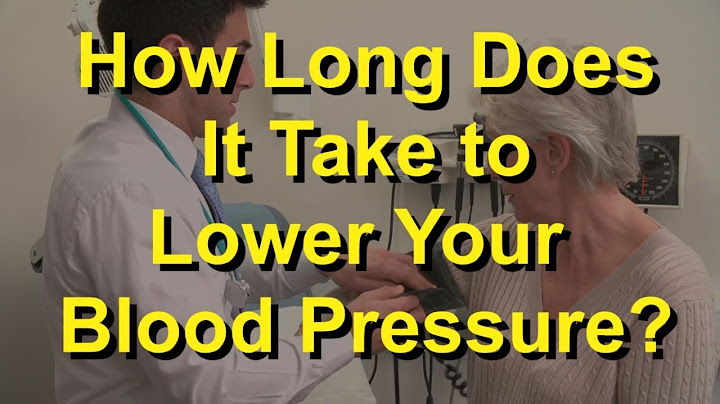High blood pressure (hypertension) affects 1 in 3 adults in the United States. Show
When a person has high blood pressure, the blood flow through the arteries is higher than normal. There are ways to prevent and treat high blood pressure. It starts with your lifestyle. Exercising regularly will keep your heart healthy and stress levels low. In addition, mindfulness activities such as meditation, yoga, and journaling can help reduce stress. The Good Brigade / Getty Images Maintaining a nutrient-rich diet will also help. Reduce your consumption of processed foods, sugar, alcohol, and fried foods. Also, it's best to avoid tobacco if you smoke. Along with a healthy diet, drinking water and staying properly hydrated can also help maintain healthy blood pressure. This article will discuss the connection between hydration and heart health and explain the recommended water intake. Dehydration and Blood PressureIt's important to stay hydrated for your overall health. There is a link between dehydration and blood pressure. When the body is properly hydrated, the heart is able to pump effectively so blood can move easily throughout the body, although more studies need to be conducted on this matter. When the body is dehydrated, the heart must use more force and pump harder to distribute blood throughout the body. It takes more effort for the blood to get to the tissues and organs. Dehydration
results in a lower blood volume which causes the heart rate and blood pressure to increase. Water and Heart HealthTo improve cardiovascular health, it's important to drink an adequate amount of water to keep your body hydrated and functioning properly. For some, plain water is fine. If you need a boost for taste, you can infuse your water with mint, cucumber, lemon, lime, and berries, among other healthy options. Vitamins and minerals such as calcium and magnesium are known to reduce blood pressure. One study performed in Bangladesh found that adding calcium and magnesium to your water can help in lowering blood pressure. By consuming these minerals through water, the body can absorb them more easily. Before adding any new vitamins or minerals to your hydration regime, consult your doctor. They can help you make the right
decision. Recommended Water IntakeHow much water should you be drinking? It depends. Many factors, such as your location, health status, daily habits, and food and drink consumption come into play. Water does the body good. It's encouraged to drink water throughout the day to stay properly hydrated. Along with helping to lower blood pressure, it can assist in lubricating the body, reducing the risk of conditions like kidney stones and urinary tract infections, and it can help improve brain function. In general, it's recommended to drink eight 8-ounce cups of water a day. It's important to note that some foods, like fruits and vegetables, also contain water. More specific guidelines include:
SummaryHaving high blood pressure means that the blood flow through your arteries is higher than normal. Treating and preventing high blood pressure starts with making lifestyle adjustments, such as getting regular exercise and eating a nutrient-rich diet. Drinking water and staying properly hydrated can also help maintain healthy blood pressure. In general, it's recommended to drink eight 8-ounce cups of water a day. It's important to note that some foods, like fruits and vegetables, also contain water. A Word From VerywellThere are ways to manage and/or prevent high blood pressure. Checking your numbers regularly and maintaining a healthy lifestyle will help. It's also important to manage your stress levels by understanding your limits and setting boundaries. Activities such as meditation, yoga, and journaling can help. Speaking with a licensed mental health professional can also help. They can give you tools to help process your thoughts and techniques to manage stress. If you're diagnosed with high blood pressure, know that you're not alone. It can be managed through lifestyle changes and planning. Work with your doctor to establish ways to reduce blood pressure and maintain a healthy lifestyle.
Frequently Asked Questions
Verywell Health uses only high-quality sources, including peer-reviewed studies, to support the facts within our articles. Read our editorial process to learn more about how we fact-check and keep our content accurate, reliable, and trustworthy.
 By Yvelette
Stines Thanks for your feedback! How can I lower my blood pressure while pregnant?Eating a balanced diet and keeping your salt intake low can help to reduce blood pressure. Find out about exercise in pregnancy, healthy eating in pregnancy, salt in the diet and tips for cutting down on salt.
Does drinking a lot of water help lower blood pressure?Something as simple as keeping yourself hydrated by drinking six to eight glasses of water every day improves blood pressure. Water makes up 73% of the human heart,¹ so no other liquid is better at controlling blood pressure.
What should a pregnant woman eat and drink for high blood pressure?Potassium-rich foods should be a part of your hypertension management diet. Foods you should add include sweet potatoes, tomatoes, kidney beans, orange juice, bananas, peas, potatoes, dried fruits, melon and cantaloupe. Potassium is an important mineral during pregnancy.
Can dehydration cause high blood pressure in pregnancy?Dangers of dehydration
Toxemia is high blood pressure during pregnancy; it's also known as preeclampsia/eclampsia, or pregnancy-induced hypertension (PIH). “Dehydration also can cause anxiety and depression, which in pregnancy can affect both mother and child,” says Bennett.
|

Related Posts
Advertising
LATEST NEWS
Advertising
Populer
Advertising
About

Copyright © 2024 en.idkuu.com Inc.


















